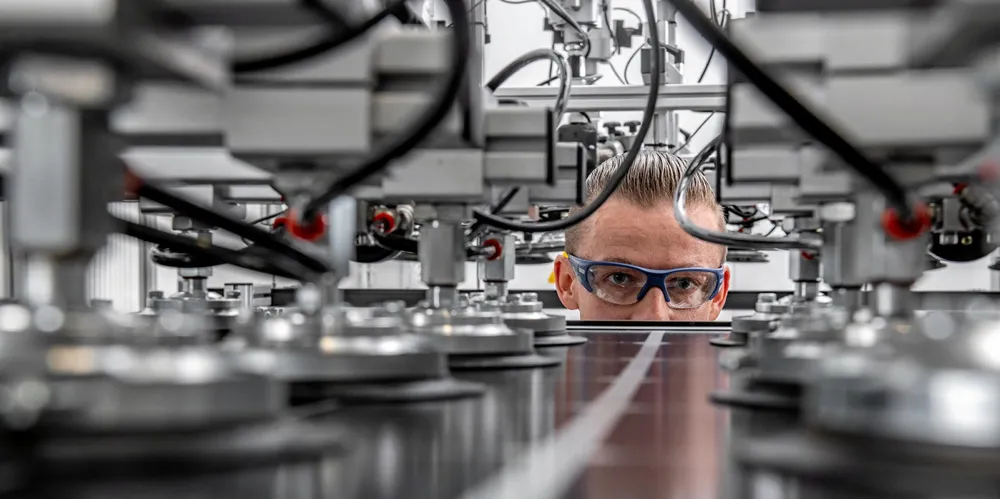'You get $110m a year' | Renewables group's threat to swap German factory growth for US on green incentives
Warning by CEO comes as Swiss solar cell and panel maker Meyer Burger closes further gigascale offtake deal from its Arizona factory and praises subsidies under IRA

Swiss solar panel manufacturer Meyer Burger has threatened to halt a planned expansion of a German solar cell factory and instead boost US manufacturing further to take advantage of generous subsidies under the Inflation Reduction Act (IRA).
"If you go to the US today with a solar cell production, you receive tax credits paid in cash," Meyer Burger CEO Gunter Erfurt told the broadcaster.
"If you produce 1GW of solar cells and solar modules in the US, you receive $110m per year."
The Swiss company had originally been planning to ramp up production in Germany and the US at the same time to cater for rising demand amid a desire by the US and the EU to become less dependent on Chinese manufacturers.
Meyer Burger is currently ramping up a solar cell factory in Thalheim, Eastern Germany, to 1.4GW per year, and is also planning to boost the manufacturing capacity of its heterojunction/SmartWire modules at a former SolarWorld factory in Freiberg, Eastern Germany, to 1.4GW.
Erfurt has earlier said the company’s “central cell manufacturing” could easily grow to 5GW, if not potentially to 10GW. Those capacity expansions in Europe may now be in question in favour of a bigger US engagement.
The EU has been trying to react to the US IRA's effect to lure European manufacturing away to the US.
Underpinning how well the US business is going, Meyer Burger announced that it has closed a gigascale offtake agreement in the US with BayWa r.e., the renewables unit of German trading firm BayWa, which the companies say will ‘contribute to the expansion of the US solar industry.’
The deal will help Meyer Burger secure sufficient demand to boost the annual capacity of its module production in Goodyear, Arizona, to about 2GW from approximately 1.6GW.
That expansion had been planned before the company warned the German government about possibly favouring the US in further production expansions.
At the same time, Meyer Burger in a letter to Germany's finance ministry has warned it may halt an expansion of its Germany-based panel factory and instead boost the US plant further, German public broadcaster ZDF reported.
The company is "considering to relocate such projects in the US. ... suitable buildings have already been found," the letter read.
"If you go to the US today with a solar cell production, you receive tax credits paid in cash," Meyer Burger CEO Gunter Erfurt told the broadcaster.
"If you produce 1GW of solar cells and solar modules in the US, you receive $110m per year."
As part of the US offtake deal, BayWa r.e. commits to procuring 1.25GW of solar panels from the plant from 2025 to 2029, which will supply the company’s 9GW US solar project pipeline.
“We are excited to be partnering with Meyer Burger on their state-of-the-art solar panel manufacturing facility in Arizona,” BayWa r.e. CEO Matthias Taft said.
“Through this collaboration, we are also supporting the expansion of European manufacturing.
“The enormous increase in demand for renewable energy offers the chance for a regional diversification of the solar supply chains, and this partnership is a significant step towards a diversified and ambitious PV value chain in the years ahead – something that can ensure the renewables industry grows increasingly resilient.”
The Arizona facility will create over 500 skilled jobs in the manufacturing of Meyer Burger's heterojunction cell technology and patented SmartWire module technology.
“We are very pleased to partner with BayWa r.e. in the US, which offers us the opportunity to rapidly grow the production of technologically leading, toxin-free, high-performance solar modules manufactured to high ethical and social standards,” Meyer Burger CEO Gunter Erfurt said.
“With our accelerated expansion, we are supporting local and sustainable manufacturing for one of the most important energy sources of the future, solar energy.”